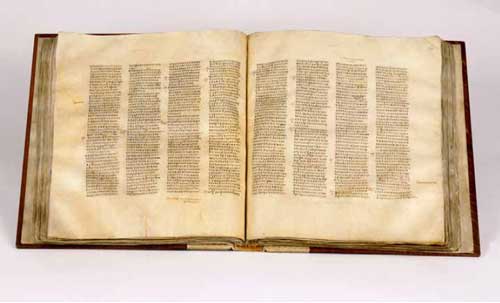A few years ago I came across a remarkable section in a book written around 124 B.C. The editor of the book wrote the following preface to help the reader understand his methodology and purpose. It shows the concern a good editor has for the ultimate reader. His job was to abridge a massive five-volume work into an abbreviated 16,000-word document. Can anyone tell me where this text comes from and the name of the editor? (Without Googling the text!) Make your best guess in the comments below. The date above suggests the answer is not Stephen King. I’ll reveal the answer in the comments later in the day. (Those of you who read a version of this post about ten years ago cannot, and I repeat cannot, reveal the answer for all our new readers.)
The number of details and the bulk of the material can be overwhelming for anyone who wants to read an account of the events. But I have attempted to simplify it for all readers; those who read for sheer pleasure will find enjoyment and those who want to memorize the facts will not find it difficult.
Writing such a summary is a difficult task, demanding hard work and sleepless nights. It is as difficult as preparing a banquet that people of different tastes will enjoy. But I am happy to undergo this hardship in order to please my readers. I will leave the matter of details to the original author and attempt to give only a summary of the events.
I am not the builder of a new house who is concerned with every detail of the structure, but simply a painter whose only concern is to make the house look attractive. The historian must master his subject, examine every detail, and then explain it carefully, but whoever is merely writing a summary should be permitted to give a brief account without going into a detailed discussion. So then, without any further comment, I will begin my story. It would be foolish to write such a long introduction that the story itself would have to be cut short.
Note a few pearls of eternal wisdom from this ancient editor:
Editing is hard work (“sleepless nights”). If you walk by an editor’s desk, it looks like they are just staring at a page and making an occasional mark–having fun reading a book. Actually, that editor is mentally juggling content, clarity, grammar rules, house style, author’s intent, and more, all at the same time. (What you don’t say to the editor at that moment is, “Oh I see you aren’t doing anything. Can I ask you a question?”)
Editing has its own satisfaction. In my office is a bookcase containing a copy of every one of the 150+ books I edited while working as an editor for Bethany House Publishers. It was a sincere and humbling privilege to participate in their creation. I can tell a story about every one of them. They became a part of me even though my name rarely appears, other than on the occasional acknowledgment page. Editors take pride in their work. It is important to respect that. (If you want to see a list, it can be found at the bottom of this linked page.)
The Editor knows their role. The metaphor of the housebuilder versus the house painter is perfect. We know the author does the heavy lifting and creates the ideas. Yet every editor knows they are part of the process and their job is to make the author look good. It was wonderful to watch Max Lucado receive ECPA’s Pinnacle Award last week, an award given to only four people in history. During his acceptance speech, he named a lot of well-deserving people, including his effusive appreciation of the editors he has worked with for so many years.
The behind-the-scenes role of an editor is similar to that of the literary agent. That is why our agency’s slogan is “to help change the world word by word.” We are not the author, but our job is to help the author navigate the publishing-industry labyrinth.
As you think of this ancient editor who was wrestling with the challenges of his profession over two thousand years ago, take a moment to write a thank-you note to your editor. They earned it. Hey, they had to work with you, didn’t they?




 Fun Fridays – May 14, 2021
Fun Fridays – May 14, 2021

Wow! Steve, I’m going to guess on this one but I think that the editor of our lives is the Holy Spirit, as He trims and prunes us into being the person He wants us to be.
Pure guess: Tacitus?
He toils away behind the scenes,
through the sleepless nights,
polishing another’s dreams,
his name unframed by lights,
and yet, he knows the dignity
that comes with his vocation,
for stands no house nor city
without a firm foundation,
and thus he holds his diligent
and gimlet-eyed attention,
for though not in the firmament
he knows and loves his station,
and at every close-of-day
The Editor has earned his pay.
The apostle Paul?
I don’t know the answer, but Steve said 124 BC and Paul was born over 100 years after that.
The 124 BC is throwing me because the “big names” I can think of would be either too early or too late . This is a fun game though!!
My guess is something about the Maccabees and their rebellion.
My guess is Eusebius.
Here’s another footnote of history–actually a forward (hand-written) in one of the first Bible Tomes ever hand-printed, Codex Alexandrinus:
“Bound to the Patriarchal Cell in the Fortress of Alexandria. He that lets it go out shall be cursed and ruined. The humble Athanasius wrote (this).”
“Don’t take my Bible!” It makes me think, do we treasure the Bible as much now that we carry it everywhere (on our smartphones)?
(https://www.historyofinformation.com/detail.php?entryid=2602)
Another note about this–Cyril Lucaris (Orthodox Patriarch of Constantinople) brought Codex Alexandrinus from Egypt. He himself was influenced/converted by Calvin and was killed while he was “reforming” the orthodox church.
I have no idea but what to thank all those editors out there especially the ones who’ve taken time to work with me. They’ve kept me humble and given me some knowledge along the way.
I could have used an editor then.
Hmmm … I may have read the post ten years ago … but I can’t remember at all. I’m trying to think what might have been around back then. The Epic of Gilgamesh, The Odyssey, The Illiad. How old were the writings of Heroditus? I probably spelled all those wrong, ha! Ooooh, something from Ashurbanipal? I’m excited to see the answer later today!
I have no educated guess to offer, but I concur about the value of an editor. I am overwhelmingly grateful for my editor and I tell her so on a regular basis. Writing a book is a team effort. What a gift to have a gracious and skilled editor partnering with me on the journey toward publication.
If not for the date I would have guessed Luke (New Testament).
Absolutely, no earthly idea. I do want to know if you were there. Just joking, of course.
🙂
Nora,
Yes, I was there. I am a time-traveling editor. Hunting dangling participles through the span of the ages.
It’s refreshing to see a touch of writing history in this post today. Wow, what a longstanding responsibility we bear!
Two decades ago you critiqued my book. You mentioned it had so much research that a typical writer would only do less than one-tenth that for a book. The problem I have now is that almost half this new work is genealogical tables. How do you edit such a book?
Dennis,
One idea would be to take out the intense detail and put it into a website as supplementary material for the book.
Or make it 100% an academic project and seek a university press or a press that focuses on academic works or self-publish.
Drum roll please.
Bill? You were the closest. I suspect you guessed solely based on the date of the manuscript.
It is time for the “great reveal.”
The passage above is from Second Maccabees 2:24-32. The editor is not actually named, so that was sort of a trick question. In verse 23 the editor is saying that he is abridging the five-volume history of the Maccabean revolt written by Jason of Cyrene. That five-volume history has been lost and there are no existing copies of it left. All we have is the abridged editorial work.
Second Maccabees was included in the Septuagint (the Greek translation of the Old Testament) around 100 B.C. Later as part of what is called the Apocrypha or the Deuterocanonicals.
There are indeed a 1st, 2nd, 3rd, and 4th Maccabees, but they are not a series of related books, like 1st and 2nd Kings. The history found in First Maccabees is usually the most familiar.
Second Maccabees, from which we quoted above, is an abridged story that focuses mostly on the early conflict in the region. In fact, the first seven chapters cover the same history you can find in chapter one of First Maccabees.
3rd Maccabees is a much earlier story in the history of the Jews between the testaments and is left out of many canons. (It tells the story of the conflict between Ptolemy IV and Antiochus III when Ptolemy tried to ride elephants into the Temple at Jerusalem.)
4th Maccabees is an expansion of the extraordinary martyrdom stories found in chapters 6 and 7 of 2nd Maccabees.
I came across this when I taught the Apocrypha in our Sunday morning Bible class a few years ago. I had been teaching the Old Testament chronological order. When we came to the end (with the building of the walls of Jerusalem found in Nehemiah, the last book, chronologically). Our class agreed that we should study the “400 Silent Years” of history before the New Testament. The books of that era are known as the Apocrypha or the Deuterocanonicals.
Spend some time studying what happened in the time before the New Testament era. The Greeks, the Romans, the Herods, are all quite fascinating.
If you want to read a very accessible history of this time, look at The World of Jesus by Dr. William H. Marty (2013, Bethany House Publishers) Link here: https://amzn.to/3yixhff
You’ll find it very readable and only 176 pages long!
Fascinating. I have a Catholic Bible with the Apocrypha and have read a little. Sounds like a great class. I took a break from my secular academic reading this morning and picked up my copy of the Sermons of Jonathan Edwards that I bought a few years ago but hadn’t yet read. Very timely.
The date was my basis for my guess. Thanks for the challenge.